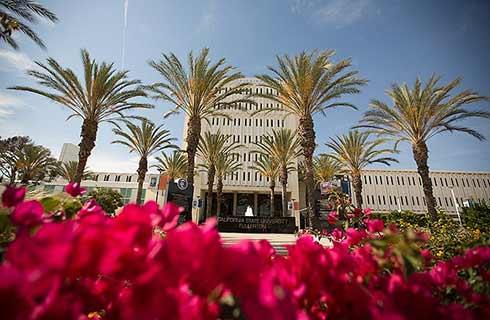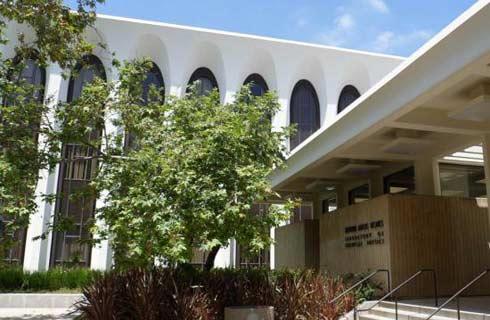西班牙语和语言学文学士
BA in Spanish and Linguistics

学历文凭
Double Major Degree

专业院系
College of Arts and Sciences

开学时间

课程时长

课程学费

国际学生入学条件
Apply as a first-year student if you are currently in your last year of high school, have completed high school, are a GED recipient, or have completed a high school equivalency exam. If you are currently in high school and are part of a dual enrollment program, you should also apply as a first-year student.
English Proficiency Testing Results:
Test of English as a Foreign Language Internet Based Test (TOEFL iBT): Students who are most competitive for admission will have a composite score of at least 90-100 and minimum scores of 20 in each section
IDP—雅思考试联合主办方

雅思考试总分
7.0
- 雅思总分:7
- 托福网考总分:90
- 托福笔试总分:160
- 其他语言考试:Duolingo English Test (DET) - Students who are most competitive for admission will have a total score of at least 120-130.
CRICOS代码:
申请截止日期: 请与IDP联系 以获取详细信息。
课程简介
The Spanish & Linguistics major enables students to combine the study of human language from a variety of perspectives with the study of Spanish language, literature, and culture.In their linguistics courses, students explore the formal structures of language (sound system, internal structure of words, syntactic organization, and representations of meaning) as well as language universals, variability across languages, social dimensions of language use, and historical language change. In their Spanish courses, they learn about the essential grammatical structures and principles governing pronunciation of the language, improve their reading and listening skills, and develop proficiency in speaking and writing. They also gain an understanding of Spanish cultural and literary traditions and learn to analyze and appreciate great literary and cultural works. Integrating the two components of the joint major, coursework in Spanish linguistics focuses on the historical development of Spanish, on variation in the uses of Spanish in different parts of the world, or on the distinguishing characteristics of Spanish in relation to other languages. Class projects and interactions with faculty provide frequent opportunities for making connections between the major’s two primary areas of study.The joint major equips students with language skills and cultural competence for employment across all economic sectors and provides excellent background for a range of careers including language education, testing and assessment, translation and interpretation, international business, speech therapy, voice coaching, information technology, law, nursing and medicine, child development, and social work. It also prepares students for graduate study in the areas of language, literature, linguistics, and related areas such as Latin American or European regional studies and cognitive science.Learning OutcomesAn understanding of the fundamental questions that drive modern linguistic research concerning formal structure, universals, acquisition, historical change, variation, and social dimensions of use, along with foundational knowledge in the core areas of linguistic theory.The ability to identify and describe with precision the empirical patterns found in sets of language data, and to construct well-reasoned linguistic analyses by formulating, testing, and refining hypotheses about these patterns.Linguistic mastery of some aspect of modern-day Spanish (phonetics, phonology, variation, e.g.) or of the historical development of the language.Proficiency in the Spanish language at an advanced level, with respect to reading, writing, speaking, and understanding of spoken Spanish.Critical and analytical engagement with Hispanic cultural and literary traditions, practices, genres, and great works.
相关申请
 预科
预科 奖学金
奖学金 实习机会
实习机会 在校学习
在校学习 跨境学习
跨境学习 校园授课-线上开始
校园授课-线上开始 在线/远程学习
在线/远程学习
开学时间&学费
学费信息仅供参考,请与IDP联系以获取详细信息
| 开学时间 | 时长 | 学费 | 地点 |
|---|
学校排名

世界排名62
数据源:
泰晤士高等教育世界大学排名
关于波士顿大学

在波士顿大学(Boston University),我们专注学术,这就是为什么我们被《美国新闻与世界报道》排在全球大学第37位!课堂充满了挑战,你能够和杰出的导师,诸如诺贝尔和普利策奖得主,富布赖特学者,或前桂冠诗人一起在学海中遨游。你可以选择超过250门课程,包括全美顶级的生物医学工程专业、商科,法律预科,经济学,医学预科等。在大一,你就可以参与本科生学术研究项目(UROP),与导师一起进行前沿领域的研究。学生和教师的比例13:1,平均班级人数为27人,坐拥大型研究型大学的资源,你可以在一个严谨的学术社区中学习。另外,你将有机会申请10个本科院校的双学位课程。不管你的兴趣是什么,你都能在全球课程中进行学习。通过全美最早的留学项目,你有很多机会到国外学习和实习。毕业后,你将成为全球校友网络的一部分,在世界上186个国家生活和工作。不管你的学术兴趣是什么,波士顿大学(Boston University)都会提供给你机会。在波士顿大学(Boston University)有屡获殊荣的导师任教,包括诺贝尔奖得主,前桂冠诗人,富布赖特学者和麦克阿瑟式的天才,有超过90个国家的1100多名外国导师在这里教学,给你的课程带来了全球化的视野。作为美国高校协会的会员机构,学校通过其优良的师资和令人钦佩的研究受到认可。这些教授把他们在前沿领域的研究带入你的课程中。通过本科生学术研究项目(UROP)你也有机会和这些出色的学者一起工作。英语语言中心和辅导项目是波士顿英语语言强化的重要部分。CELOP根据你的英语水平提供高质量的英语和美国文化教小班学。你将得到最先进的英语强化教学方法,高度个性化的关注。通过CELOP,你可以利用阅读或加入讨论组、学术研讨会、和社会活动的方式提高英语水平。你也可以参加一个对话伙伴项目,通过本地英语人士来帮助你练习你的语言或提高你的文化素质。 波士顿市和美国是一个有许多实习机会的中心涉及医学,生物医学、艺术、历史、金融、工商管理、旅游等领域。波士顿大学(Boston University)本地学生在许多行业成为领导者,如万豪酒店,红袜队,贝斯以色列女执事医疗中心,富达投资等公司实习。学生还可以到首都华盛顿特区或好莱坞中心去参加政界和电影业的实习项目。 此外,波士顿市率先提出了一个全球性的实习计划,提供了出国留学的经验。留学顾问的工作,帮助学生找到相匹配的职位,符合学生的学术兴趣。结合课程,在一个有特色的学术环境和专业工作经验下,加深学生对文化和留学国家工作环境的理解。 实习工作包括在瑞士日内瓦的世界卫生组织,解决艾滋病问题。在伦敦下议院工作提高国际关系能力。在都柏林爱尔兰轮椅协会,帮助家长从经济困难中脱离出来
本校相关课程

Master of Sacred Theology (STM)
学历文凭
Masters Degree
开学日期
课程费用总额


神圣音乐大师
学历文凭
Masters Degree
开学日期
课程费用总额


神学硕士
学历文凭
Masters Degree
开学日期
课程费用总额


Master of Science in Health Services and Systems Research
学历文凭
Masters Degree
开学日期
课程费用总额


生物统计学文学硕士
学历文凭
Masters Degree
开学日期
课程费用总额


工商管理硕士/公共卫生硕士
学历文凭
Double Major Degree
开学日期
课程费用总额










 美国
美国